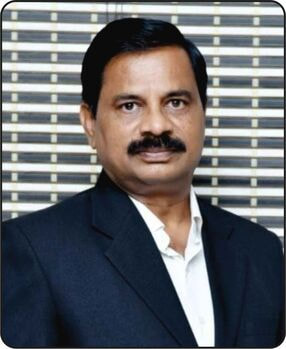|
H. Balakrishna is a senior HR Leader with about 33 years of meritorious experience in the field of HR, IR, Legal & Administrative in various Indian and MNC companies. Presently, Balakrishna heading HR & IR Academy as CEO and providing HR & IR services for industries and training the HR Professionals on various aspects of HR, IR, Legal & Administration. He was formerly heading Human Resources Department at Wipro Infrastructure Engineering. Previously associated with KDDL Limited, Saint-Gobain Abrasives, ICL Sugars Limited, and Ralectronics Limited. Balakrishna holds an MBA, LLB, and PGDPM & IR from prestigious institutions. He carries a strong conceptual knowledge and contributed substantially in the areas of HR, IR, Compliance Management, Legal, Long-term Settlements, Administration, Safety, Business Development, and Policy formulation. Balakrishna has conducted several training programs covering various functions of HR, IR & Safety. He trained more than 1000 young HR Professionals so far and guided them as Mentor. Balakrishna believes in continuous learning and is passionate about developing young HR Professionals. The 'hot stove rule' is one of the methods that can help you to avoid awkwardness and hard feelings if you use it in the right way. Nowadays, managers in various businesses regularly use it and it is more than a simple disciplinary method. 1. How do you define industrial relations based on your experience? In a broad sense, I firmly consider Industrial Relations means the relationship between the employees, employers, various unions, contractors, private stakeholders, and the government authorities. I believe that relations of all those associated with an industry or establishment may be called as Industrial Relations. Industrial relations has its own roots in the industrial revolution, which created modern employment with global relationship by spawning free labour markets and large-scale industrial organizations with lakhs of workers. As society wrestled with these massive economic, global and social changes, labour problems arose. Industrial relations include individual relations and joint consultation between labour, management, unions, contractors, private parties, the state, etc. It pinpoints the importance of compromise and accommodation in place of grievance, dispute, conflict, and controversy in resolving disputes between labour and management. It also refers to a field of study that examines these types of relationships, especially groups of workers in unions. 2. Name some of the complex challenges you faced in your HR and IR journey.
3. What are the main concerns of the internal workers union leadership?
4. Even in the era of automation, the employees are operating with a traditional mindset. Is this true? Not really. Nowadays, many employees started understanding the importance of automation in a competitive world. The skill shifts have accompanied the introduction of new technologies in the workplace since the Industrial Revolution, but the adoption of automation and Artificial Intelligence (AI) will mark an acceleration over the shifts of even the recent past. The need for some skills, such as technological as well as social and emotional skills will rise, even as the demand for others, including physical and manual skills will fall. These changes will require employees everywhere to deepen their existing skill sets or acquire new ones. Companies too, will need to rethink how work is organized within their organizations. 5. How would you describe the “hot stove rule” and how it applies in the industry? The 'hot stove rule is one of the methods that can help you to avoid awkwardness and hard feelings if you use it in the right way. Nowadays, it is regularly used by managers in various businesses and it is more than a simple disciplinary method. It is supposed to help a manager perform disciplinary action without making an employee feel resentful or bitter. The hot stove rule draws parallels to feelings you get after touching a hot stove. When you see that the stove is red, you immediately know it is burning hot, and if you reach it, you will get hurt. Let us say you touch it anyway. The result is instant; you feel pain. You get angry, but only for a second. Obviously, it is not the stove's fault – it's not intentionally trying to hurt specifically you – so you are actually angry at yourself. But, you understand that what you did was not wise. If you repeat this action, everything is going to happen in the same way as before, with no exceptions. The same goes for disciplinary action against an employee. The principle, the Hot Stove Rule, is an analogy between breaching company discipline and touching a hot stove. 6. The fundamental Success Mantra of IR is “Line managers are HR Managers.” Is this true? The long-term success of IR highly depends on Line Managers rather than HR Managers. The Line Managers are the primary contact for their team members and their rapport with workers will decide the culture of the shop floor. If the Line Managers start handling the people effectively and provide the confidence of togetherness, the majority of the grievances will get resolved within their levels without reaching HR. If no grievances - no problems; if no problems – no concerns; if no concerns – not dissatisfaction and if no dissatisfaction – no IR issues. The Line Managers are capable to set this flow. Hence, I agree that the fundamental success mantra of IR is “Line Managers are HR Managers.” 7. Most young HR professionals have a serious problem of "lack of IR and labour laws" knowledge. Is this a major concern? You are absolutely correct. In the recent past, I noticed many the young HR Managers prefer to settle only in HR, but not in IR, since they lack in handling industrial relations and do not having sufficient knowledge of labour laws. The HR professionals must have a comprehensive knowledge of labour laws and its corresponding regulations in addition to other HR functions to become successful in HR. Lack of labour laws knowledge leads to non-compliance and the same will affect negatively the reputation of a company. Hence, the knowledge of labour laws is a key requirement for HR Professionals. HR Professionals must monitor legal changes and adapt company policies and procedures accordingly. These policies must also be effectively communicated to all employees so that they are aware of their rights and the company as a whole has a common shared vision. 8. What are your tips for engaging employees around the main vision and purpose of the company? These are my simple tips:
9. Can HR professionals take the top position of the organization and succeed? “I'm a people person” and “I like helping others” are two common reasons IR & HR professionals give for choosing their career path. While they're good enough reasons to get started, they aren't nearly good enough to be great. The HR Professionals are capable to take the top position of the organisation if they master in the following: 10. If you are a union leader, what advice do you give to workers union leaders? My simple suggestions are…
11. What methods/strategies can help improve good industrial relations in the Company? In my opinion, the following are the strategies and best practices for improving employee relations at the workplace:
12. Have you ever been sad about choosing HR and IR as a career? Never in my career so far! IR & HR is definitely not boring or unfulfilling as a career. In IR & HR, you are always working with people and more often helping them to excel. Some of the major reasons why people choose a career in HR & IR are the opportunity to influence innumerable aspects of the organisation, to assist in the development of its employees, and to play a part in influencing strategic business decisions.
0 Comments
Leave a Reply. |
ArchivesCategories
All
|
||||||||
SITE MAP
SiteTRAININGJOB |
HR SERVICESOTHER SERVICESnIRATHANKA CITIZENS CONNECT |
NIRATHANKAPOSHOUR OTHER WEBSITESSubscribe |
MHR LEARNING ACADEMY
50,000 HR AND SOCIAL WORK PROFESSIONALS ARE CONNECTED THROUGH OUR NIRATHANKA HR GROUPS.
YOU CAN ALSO JOIN AND PARTICIPATE IN OUR GROUP DISCUSSIONS.
YOU CAN ALSO JOIN AND PARTICIPATE IN OUR GROUP DISCUSSIONS.
|
|





 RSS Feed
RSS Feed





